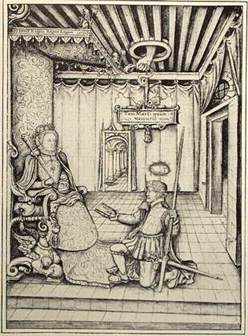The humanists
The wave of relearning, especially of Greek, that we associate with the Renaissance, took some time to reach England; but when it did, it created scholars of distinction. The great Dutch scholar Erasmus* spent some time in England with his friends, Sir Thomas More, John Colet, and others*.
The first humanists wrote in the language of learning -- Latin. The second generation of scholars moved towards a championing of modern languages as appropriate for making knowledge more freely available; one consequence of this change was that many writers felt a need to introduce new words into English.
The early humanists in England were teachers rather than writers, and what they did write was instructive rather than literary. They shared a dream: that learning would make those who ruled rule more justly; more generously.
The dream . . .
Scholars like Roger Ascham, who tutored Queen Elizabeth, and Sir Thomas Elyot, who directed his major work to those in power--The Book Named the Governour (1531)-- believed that the ideal ruler would be well educated in Christian literature and the classics, and thus would share the highest virtues of both. Above all, the ruler would be well versed in philosophy, and history (from which many lessons are to be learned); but poetry, music, the visual arts, and dancing were not to be neglected.
In some measure the Tudors fitted the description; whether they were always ideal rulers is another question.
Another important effect of the humanists was their emphasis on the power that individuals had to shape themselves and those around them, most obviously through education. The effect of this belief on the arts was profound, from the introspective poetry of the sonnetteers to the increasing fascination of Renaissance artists in characterization and drama in their portraits.
The end of the humanist dream*?*
Footnotes
-
Erasmus
Erasmus' Latin translation of the Bible, based on the earlier Greek text, was enormously important and influential. His original works, often barbed with a sharp humour, included The Praise of Folly, The Education of a Christian Prince, and the Colloquies. Like his friend Sir Thomas More, Erasmus attacked the abuses of the clergy, but backed away from the more radical moves of the Reformation.
-
Other names
William Grocyn, benefactor of Erasmus; Thomas Linacre, founder of the Royal College of Physicians; William Lyly, creator of the Latin Grammar Shakespeare used (he quotes it in The Merry Wives of Windsor), and grandfather of John Lyly; and on the fringe of the group, the eccentric poet John Skelton.
-
The dream dissolves
When the learned Dr Faustus offers to burn his books just before he is dismembered onstage, and damned eternally, Marlowe was prefiguring a change in mood, a disillusionment that came with the realization that educating the monarch did not prevent human nature from succumbing to pride, avarice, envy, anger . . . especially pride and avarice, with their attendant corruption at all levels of government. By the reign of James, the humanist dream had faded, and scholars embraced the realpolitik of Bacon (or Machiavelli).
Nonethless, the humanists have left a lasting legacy in the belief in education: "Learning therefore, . . . and not blind and dangerous experience, is the next and readiest way that must lead your children, first to wisdom, and then to worthiness" (Roger Ascham, The Schoolmaster).
